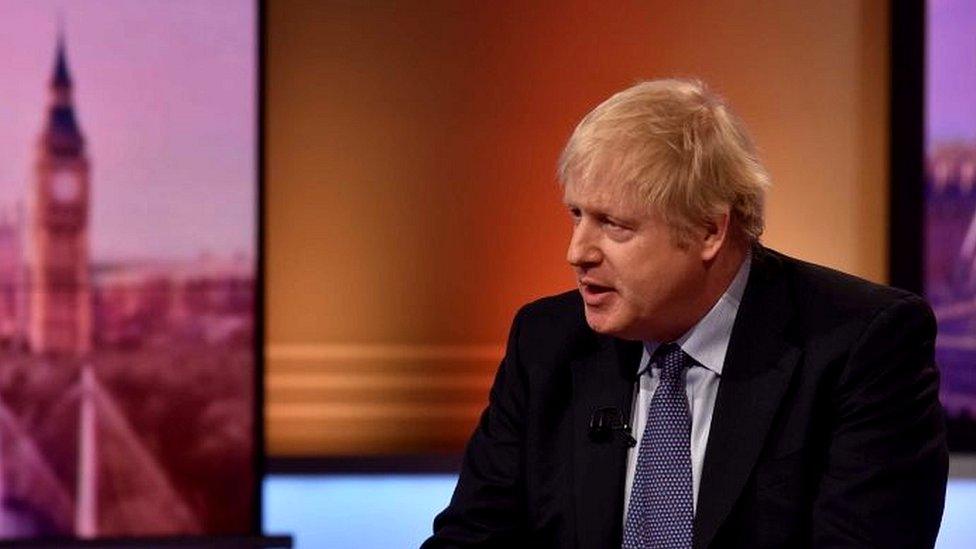PM's child poverty claims 'inaccurate,' says statistics watchdog
- Published

Boris Johnson claimed 400,000 fewer children were living in poverty when he was interviewed on the Andrew Marr show
Boris Johnson has made a number of inaccurate claims about child poverty levels since coming to power, the UK's statistics watchdog has said.
The PM has argued that poverty levels have come down under his government.
But the Office for Statistics Regulation (OSR) said some of the figures he has quoted to back this claim up are incorrect.
Labour is calling on the Mr Johnson to "correct the record" and "come clean" about the government's performance.
Asked to comment by the BBC, Downing Street pointed to a previous statement made by the PM, external, in which he said that "as of December" there were "740,000 fewer children living in a household where no one works".
The OSR, which is the regulatory arm of the UK Statistics Authority watchdog, was responding to a complaint from the End Child Poverty Coalition.
The coalition highlighted three instances when the prime minister made what it described as "misleading" statements.
These were:
Mr Johnson's claim on the BBC's Andrew Marr Show on 1 December 2019 that there "are 400,000 fewer children in poverty than there were in 2010"
His statement at PMQs on 17 June that "absolute poverty and relative poverty have both declined under this government" and "there are hundreds of thousands, I think 400,000, fewer families living in poverty now than there were in 2010"
Mr Johnson's claim at PMQs on 24 June, in which he said that "there are 100,000 fewer children in absolute poverty and 500,000 fewer children falling below thresholds of low income and material deprivation".
The BBC's Reality Check team has also found inaccuracies in the PM's statements on child poverty, and was unable to find any evidence for his claim that there are 400,000 fewer families living in poverty than in 2010.
In a letter to the OSR, End Child Poverty Coalition chairwoman Anna Feuchtwang said: "It cannot be right that official figures on something as fundamental as how many children are in poverty continue to be used selectively, inaccurately and, ultimately, misleadingly."
Responding to the complaints set out in the letter, Ed Humpherson, director-general for regulation at the statistics authority, said: "Our team has investigated the statements which you highlight (and has reached the same conclusion that these statements are incorrect)."
'Obscuring the issue'
Ms Feuchtwang welcomed the OSR's conclusion, adding: "It is deeply insulting to the children and families swept into poverty when data about them is used selectively and misleadingly at the whim of politicians.
"The simple fact is that by any measures child poverty is rising but instead of tackling the problem the government risks obscuring the issue and misinforming the public.
"The lives of real people are at stake and we need consistent use of information and urgent action."
Imran Hussain, director of policy and campaigns at Action for Children, said that the longer the UK government is in denial of the scale of child poverty, the harder it will be to fix.
Labour's shadow education secretary Kate Green said it was "shameful" that the prime minister "is unable to tell the truth about the hardship faced by so many families struggling to make ends meet".
She added: "The prime minister must now correct the record, both publicly and in Parliament, and ensure that when he next raises his government's damning record on child poverty, he comes clean about what the stats are saying."

ASK MARTIN LEWIS: Answering your questions about travelling to Spain
